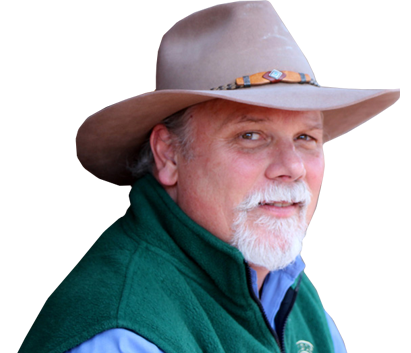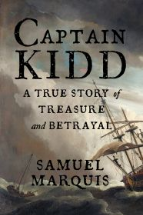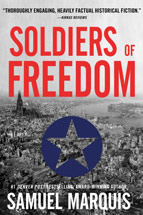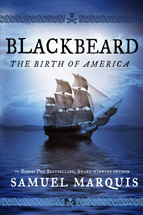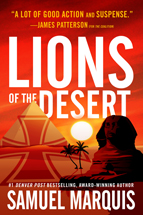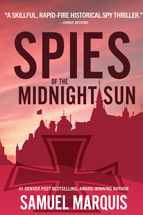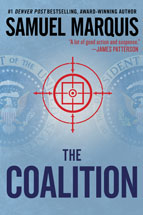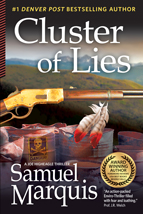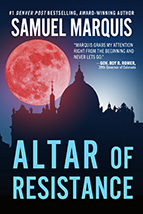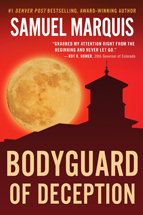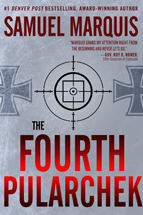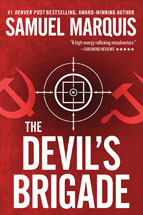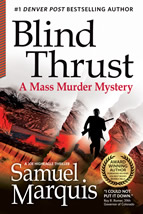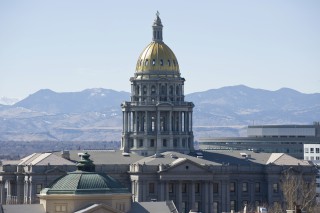
What type of books do you write?
I currently write American narrative nonfiction history books, after having written historical fiction and modern-historical suspense novels. My area of expertise in American history is from early colonial America through WWII. My most recent release to hit bookstores, Captain Kidd: A True Story of Treasure and Betrayal (Diversion/Simon & Schuster) about my legendary ninth-great-grandfather, was the 2025 Readers’ Favorite Book Awards Gold Medal Winner-Nonfiction Historical.
What different projects do you have in the works?
My newest American history book, Empire and Frontier: Colonel Peter Schuyler and the Valiant Iroquois in King William’s War (1689-1701), will be published by Pegasus/Simon & Schuster in July 2026. The book tells the epic story of frontiersman Peter Schuyler, regarded as the George Washington of early colonial America, who fought alongside the Five Nations of the Iroquois against the French and their Indigenous allies during the first and most important imperial conflict between England and France in the New World. The book reveals how fragile alliances and cross-cultural diplomacy changed the course of empires in North America. Schuyler, the Dutch-American mayor of Albany, Indian Affairs commissioner, and militia colonel earned deep trust among the Iroquois. Decades ahead of his time in his respect for Native diplomacy and sovereignty, Schuyler helped forge and sustain a fragile alliance between English colonists and the Haudenosaunee (Five Nations of the Iroquois) during a decade of brutal warfare. That alliance, known as the Covenant Chain, not only checked French ambitions in the region but also shaped the political and military landscape of the American frontier for the next hundred years. The book is The Last of the Mohicans meets Turn: Washington’s Spies.
It’s fascinating that you’re the ninth great-grandson of the notorious privateer-pirate Captain William Kidd. How has that relationship influenced your perspective and research on pirates?
Most of all, the ancestral connection to Captain Kidd has made me want to strive for historical accuracy because privateers, or private licensed commerce raiders, like Kidd and outlaw pirates like Blackbeard during the Golden Age of Piracy have been inaccurately portrayed in books, movies, and television. Historians, authors, and filmmakers are going to have different interpretations of character and motivation, but they should never purposefully deviate from the established historical facts. In Blackbeard: The Birth of America, Captain Kidd: A True Story of Treasure and Betrayal, and my forthcoming Empire and Frontier: Colonel Peter Schuyler and the Valiant Iroquois in King William’s War (1689-1701), I have worked hard to ensure historical accuracy.
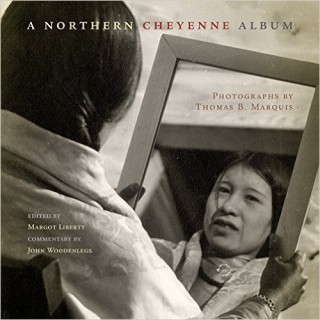
Three of your books feature Cheyenne Indians as protagonists and Native American characters can be found in several of your novels. What sparked your interest in Plains Indians, and the Cheyenne in particular?
Growing up in Colorado, I have always been interested in stories of the Plains Indians and Wild Wild West, but what truly sparked my interest was digging into the history of my great ancestor, Thomas B. Marquis. Dr. Marquis (1869–1935) was a physician, ethnographer, author, photographer, and important chronicler of the 19th Century American West. He practiced medicine in Montana, was with the U. S. Medical Corps during World War I, and served as physician on the Tongue River-Cheyenne Indian reservation after the war. Because of his interest in Plains Indians, he eventually gave up his medical practice and devoted full time to learning Indian sign language, gathering historical data from the Northern Cheyenne, and writing about their culture and the Plains Indian wars. During the course of his career among the Northern Cheyenne, he interviewed many old warriors who had participated in the 1876 Battle of the Little Bighorn. He realized that these interviews could eventually lead to a book about the Custer Battle participants that would take into account both the Indian and U.S. Army perspective and dispel many Custer myths. Eventually, Marquis moved to Lodge Grass on the Crow Indian Reservation to interview Custer’s Crow Scouts, and to be able to see and study the actual battlefield. The Indians trusted him, allowed him to photograph them, and told him things via sign language that they would reveal to no one else. His books include Memoirs of a White Crow Indian (1928), Wooden Leg: A Warrior Who Fought Custer (1931), Two Days After the Custer Battle (1935), Custer, Cavalry and Crows (1975), Keep the Last Bullet for Yourself: the True Story of Custer’s Last Stand (1976), and many other works. It is because of Thomas B. Marquis that my protagonist, Joe Higheagle, and his curmudgeonly grandfather, John Higheagle, were created and why I weave the Cheyenne, Custer, and the Little Big Horn into my books. The Northern Cheyenne loved Thomas B. Marquis like a brother and he loved them back. Like him, I greatly admire the Cheyenne Indians, the finest horse people of the Great Plains along with the Comanche.
Who are your favorite authors?
In terms of literature and literary fiction, I am a great admirer of Hawthorne, Fitzgerald, Hemingway, Steinbeck, A.B. Guthrie, Jr., Michael Shaara, Larry McMurtry, E.L. Doctorow, and Charles Frazier. For non-fiction history and narrative nonfiction, my roster of greats includes Rick Atkinson, Ron Chernow, H.W. Brands, Robert Utley, Daniel Richter, Hampton Sides, S.C. Gwynne, Nathaniel Philbrick, Erik Larson, and Stacy Schiff. I tend to gravitate towards authors who tell stories in the same way I do and strive for historical accuracy, and to subject matter dealing with my areas of research interest in colonial American history, privateers and pirates, the Indian Wars, and WWII.
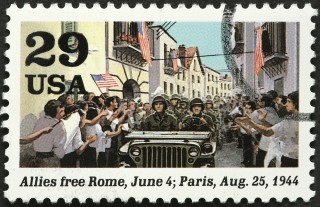
Where do you get the ideas for your books?
The source of inspiration for my books generally comes from my family history and reading American and European history books, or my desire to recreate a historical time period that I am particularly interested in. As the ninth great-grandson of the legendary privateer Captain William Kidd, I love seafaring adventure and privateer/pirate stories. For better or worse, I am one of those authors whose brain is literally flooded with ideas for books. My common thread is that all of my novels pit an underdog against powerful forces and are multiple-point-of-view family stories involving grandparents, mothers and fathers, and siblings built upon a framework of fast-paced historical suspense.
Did you always know you wanted to write history books?
Deep down, yes. I’ve written more than twenty-five professional papers on geological and environmental subjects, but I think I always had a yearning to write books. I’ve always had an overactive imagination, loved world and American history, and been a little hyperactive in terms of physical and mental activities so I have numerous stories in my head all the time vying for space. I’m a bit of an odd duck in that I’m a professional scientist who serves as a hydrogeological expert witness in court cases and yet I have this creative side that’s desperate to tell stories and write compelling historical works. So, yeah, deep down I always knew I wanted to write history books and tell unique American stories.
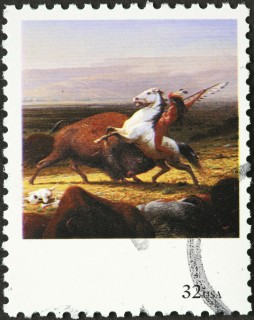
For interviews, book clubs, signings, and other book events, what are some of the things you typically like to discuss with your fans and newcomers to your American history books?
Here are the things I usually like to discuss during these types of events:
● Why I’m drawn to tell the tales of overlooked and historically misrepresented figures like Captain William and Sarah Kidd and Colonel Peter Schuyler
● My unique research methods and use of primary colonial-era and declassified WWII documents
● My approach to writing biographies and accurate history and how I stay true to the factual accounts of past events
● My writing style and techniques, particularly my use of multiple historical perspectives in handling point of view



